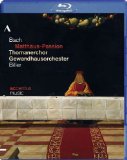| Reviews & Columns |
|
Reviews DVD TV on DVD Blu-ray 4K UHD International DVDs In Theaters Reviews by Studio Video Games Features Collector Series DVDs Easter Egg Database Interviews DVD Talk Radio Feature Articles Columns Anime Talk DVD Savant Horror DVDs The M.O.D. Squad Art House HD Talk Silent DVD
|
DVD Talk Forum |
|
|
| Resources |
|
DVD Price Search Customer Service #'s RCE Info Links |
|
Columns
|
|
|
Bach: St. Matthew Passion
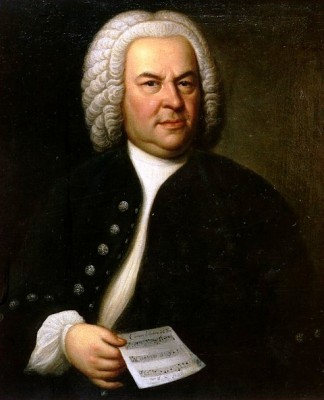
Please Note: The images used here are from promotional materials provided by Arte Live Web and public-domain photos of St. Thomas Church, Leipzig, and Haussmann's portrait of Bach; they are not taken from the Blu-ray edition under review.
In the interest of being upfront before indulging in my superlative-laden recommendation of the new Blu-ray version of Bach's towering 18th-century masterwork of an oratorio, St. Matthew Passion, I feel that a disclosure about where I think I get off speaking about such highfalutin matters might be in order. There's a reason that I've sought the privilege of writing (primarily about movies released to DVD/Blu-ray) for DVDTalk rather than looking to appraise musical performances and recordings for some other, classical-music-centric outlet: Like what I will assume is many readers, I'm many times more familiar with cinema than any music that predates rock 'n roll, and my limited knowledge of classical music, in which I have much interest but to which I have not had all that much exposure, makes me more of a dilettante than any sort of expert. But my history with St. Matthew Passion in particular is "cinematic" enough in a personally relatable way that I'm willing to venture out of my comfort zone and into lesser-known territory to sing its praises. After all, it has been through the cinema that I've been exposed to most classical music, and it's absolutely through that medium that the ongoing relevance, immediacy, and exhilaration of Bach's music, and St. Matthew Passion in particular, has been proved to me time and again. Possibly some of the great but less-mainstream films in which the Bach on the soundtrack has stood out for me -- e.g., Straub-Huillet's Chronicle of Anna Magadalena Bach, or Tarkovsky's The Sacrifice (which very memorably features the tenderly melancholy movement 39 of St. Matthew Passion, "Erbarme dich," over its opening credits, ensuring your immersion in the film to follow and piquing your curiosity about such a sublime musical selection) -- are in their own way just as rarefied and "arty" in a present-day context as classical music, ditto films by Bergman (multiple films, including The Silence and Saraband) and Bresson (L'Argent) that have seen those directors wearing their love for Bach on their sleeves. But perhaps you've seen a little film by Martin Scorsese called Casino? And maybe you remember the accompanying burst of choral music that comes up on the soundtrack to initiate its ecstatically infernal, Saul Bass-designed opening-credits sequence? That's Bach, that's St. Matthew Passion, and just like the vortices of flame that send Robert De Niro spinning through the heaven-hell universe of Las Vegas in that indelibly striking montage, the oratorio in its entirety is something so penetrating, compelling, and transporting that by the time its final strains fade into awed silence, you feel as if you've been picked up by some heavenly hurricane and set down somewhere you don't immediately recognize because you're seeing the world with newly transfigured eyes.
The way the music is presented here, too, is highly conducive to the feeling that you're on a powerful musical journey into a realm that's sacred far beyond words (whatever "sacred" means to you; St. Matthew Passion is undeniably a religious work, but as long as your ears and heart are operational, your own religious or non-religious views will play little decisive part in the music's carrying you away). Apparently recorded for Web broadcast under the auspices of France's Arte television corporation, this performance of took place on April 5 and 6, 2012, at St. Thomas Church in provincial Leipzig, Germany -- the very house of worship where Bach himself was cantor in the early-mid-18th century, and the venue where the piece was first performed and honed into its final form. The director of the televisual presentation, Michael Beyer, has had his technical team operate the camera like a roving, contemplative eye; throughout the performance, it takes in St. Thomas of Leipzig's stunning architecture, stained glass, and painting, replicating what one's own eyes might see as an actual audience member. "Big" choral movements are often accompanied by a slow, graceful dolly back to reveal more and more of the space's imposing, gothic vastness; as different voices and instruments become prominent in their turn, we're treated to close-ups of the playing and the vocalizing -- privileged, fascinating views to which few if any of the actual audience members would have access. The space is, predictably, the perfect physical setting to facilitate and reflect the music's power; by the time it's over, Beyer has thoroughly introduced us to and familiarized us with it, its performing inhabitants, and its many awe-inspiring religious artifacts, and if you watch it in ideal circumstances, with the lights off and the sound up as high as civil to any neighbors within earshot, it comes surprisingly close to simulating what it would have been like to be present at the live performance.
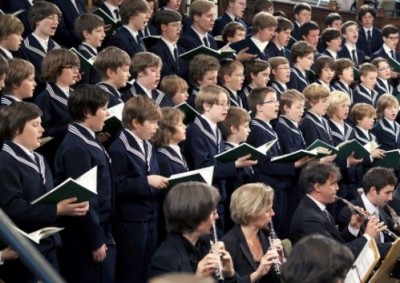
As for the music, the performers themselves are as near to the heart of the Bach tradition as possible, too; the choir and soloists are almost entirely comprised of current members or graduates of the St. Thomas Boys Choir (for which Bach himself was the cantor during his time at Leipzig), which put on St. Matthew Passion in part as a commemoration of its 800th (!) anniversary. The musicians, the soloists, and all the boys in the choir (many of whom are quite young; I would guess five to 10 years of age) appear very contemporary (I spotted more than one punk-ish hairdo and pair of modishly chunky eyeglasses), but their impassioned, eminently skilled rendering of Bach's music and melodies -- providing the setting for sung text derived from, of course, The Gospel of St. Matthew's treatment of Christ's scourging and crucifixion, along with reflective musings by the poet Picander, a contemporary of Bach's -- are ageless. They've placed themselves in absolute servitude to the music, and they make that investment, that devotion, contagious: sometimes, in the quieter sections, the emotion of what you hear gently seeps into you like dew into the ground, while at the music and voices rise up in lump-throated swells of mourning (as in the aforementioned "Erbarme dich" movement, sung to emotive perfection by alto Stefan Kahle, perhaps the most outstanding singer in a group of roundly excellent soloists) or a tide of celebratory, restorative ectasy, as in the concluding chorus (the one you'll recognize from Casino), a musical blaze of glory that aptly, unforgettably caps one of the most transformative, enduringly powerful experiences in the entire history of the world's music.
In all, this first appearance of St. Matthew Passion on Blu-ray, the highest-fidelity medium possible, is vindicated and then some by the great performance it contains, along with the very respectful, yet consistently kinetic and visually interesting, treatment it's been given by its producers (it offers lots to look at, but nothing that ever does anything less than complement and bulwark the truly important things -- the music and the singing). This is what it looks, sounds, and feels like when an inimitable, singular, and vital experience that has long been filtered in one way or another -- through ineffable snatches remembered from its use in films, as in my case, or through its many valuable but less sonically perfect and audio-only appearances on records, tapes, and CDs -- suddenly has that filter removed. The vivid, rich, multilayered high-definition sound here, in addition to the irreplaceably enhancing physical presence of musicians, choir, singers, audience, and "holy" space, makes this a likely candidate for the best reproduction so far of one of the greatest musical works of all time. St. Matthew Passion is something like the Hamlet or (not coincidentally) The Last Supper of music -- that immortal work that seems to explore, define, and fully illustrate a multitude of its medium's possibilities -- and this release gives it to you in its purest, most complete form yet. It's the closest you'll ever get, both sight- and sound-wise, to the surging heartbeat of Bach's masterful, inspired sound outside of a symphony hall or a church, and thus a must-have addition to the Blu-ray collections of even the finickiest, most classically knowledgeable audiophile as well as the perfect introductory classical Blu-ray title for those of us whose collections have until now only included Bach as excerpted for movie soundtracks. In that case, those alluring snippets, whether heard courtesy Scorsese or Woody Allen, were only appetizers leaving us primed for the mind-blowing high of the stuff when taken pure.
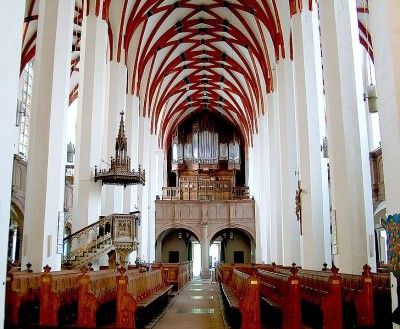
THE BLU-RAY DISC:
This performance of St. Matthew Passion was evidently recorded using high-end high-def digital video equipment, and as is so often the case, that has apparently facilitated a very nice, smooth transfer to home digital media. The 1.78:1 aspect-ratio presentation is clear, sharp, and solid in both lighter and darker segments of the screen (the singers' and performers' various skin tones remain natural-looking, while their uniformly formal black attire demonstrates no sign of crushing or softness in the image); the only noticeable compression artifact is the slightest edge enhancement, barely noticeable unless you're actively inspecting for it.
Sound:The all-important sound is available in two different tracks: A DTS-HD Master Audio 5.1 track, and an uncompressed PCM stereo track (all singing is, of course, in German; handy subtitles with translations of the libretto are available in German, French, and English). Toggling back and forth to settle on my choice, I found the latter preferable for my system and tastes (recorded music is standardly presented in stereo, and this is a music-only program), and it concentrates the sound in a way that made it more immediate to my ear, but viewers/listeners will want to decide that for themselves; either way, the sound is pure, clear, rich, and deep, minus any discernible flaw and easily up to the highest audiophile standards.
Extras:Not too much; the disc includes three trailers for other Accentus Music releases, and a beautifully produced full-color booklet containing photos and a reproduction of a contemporary/revisionist Last-Supper painting by Michael Triegel, along with an essay on St. Matthew Passion by Peter Wollny, delving into the history and details of how the work came to be, and some brief comments on this performance by Cantor/conductor Georg Christoph Biller. (Making the booklet somewhat deceptively thick, all pieces appear in their original German as well as English and French translations.)
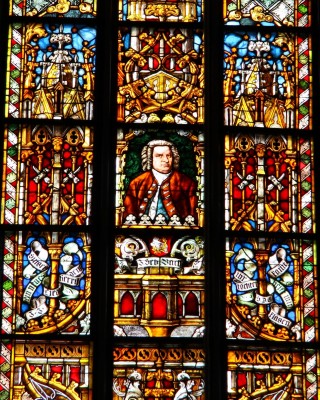
This contemporary (recorded less than one year ago) iteration of Bach's St. Matthew Passion comes bearing as much tradition, history, and authenticity as possible; it was recorded over two performances on April 5 and 6, 2012, at St. Thomas Cathedral in Leipzig, where the composer himself was once cantor for the boys choir, which recently celebrated its 800th anniversary and whose current, exquisitely talented lineup we see and hear performing the piece here. Yet by doing the fullest possible justice to Bach's genius, and regardless of being so remarkably "close to the source," what the Blu-ray under discussion actually becomes is the same thing as any top-notch performance of Bach's great work: an exhilarating testament to how universal and timeless the music feels, how far across time and space it reaches (now even further, thanks to contemporary technology, for which it's difficult to imagine a nobler purpose than making masterpieces like this available for more of us to see and hear than ever before) to bring a vital sense of the beautiful and the sacred to anyone, of any time, and irrespective of any religious/non-religious persuasion. Thanks to St. Thomas Cantor Georg Christoph Biller; the immensely talented and engaged choir and orchestra; and the technical team, headed up by Michael Beyer, responsible for digitally videotaping and audio-recording the performance in a way that perfectly preserves every sonic contour of every instrument, voice, and melody, we are given a thoroughgoing sense of the aura and acoustics of the performance, truly the next-best thing to actually being present for the music played "live." It's a magnificently executed rendition of one of the most enduring works of art ever, in any medium (perhaps more so; music is the universal language, after all), and a must-own recording of the St. Matthew Passion for anyone with any degree of interest, from the most demanding classical-music-purist audiophile to those just now dipping their toes into Bach's life-giving, faith (in art and in humanity)-restoring waters.
|
| Popular Reviews |
| Sponsored Links |
|
|
| Sponsored Links |
|
|
| Release List | Reviews | Shop | Newsletter | Forum | DVD Giveaways | Blu-Ray | Advertise |
|
Copyright 2024 DVDTalk.com All Rights Reserved. Legal Info, Privacy Policy, Terms of Use,
Manage Preferences,
Your Privacy Choices | |||||||









